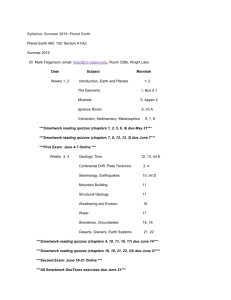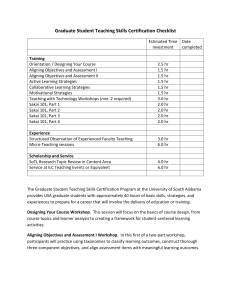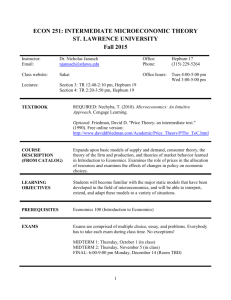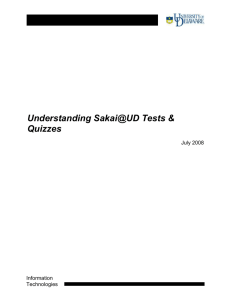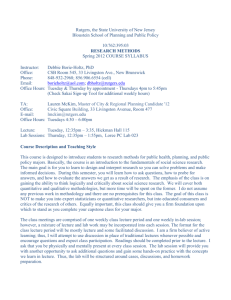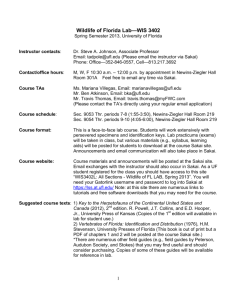LEI 2181: Leisure in Contemporary Society Syllabus
advertisement
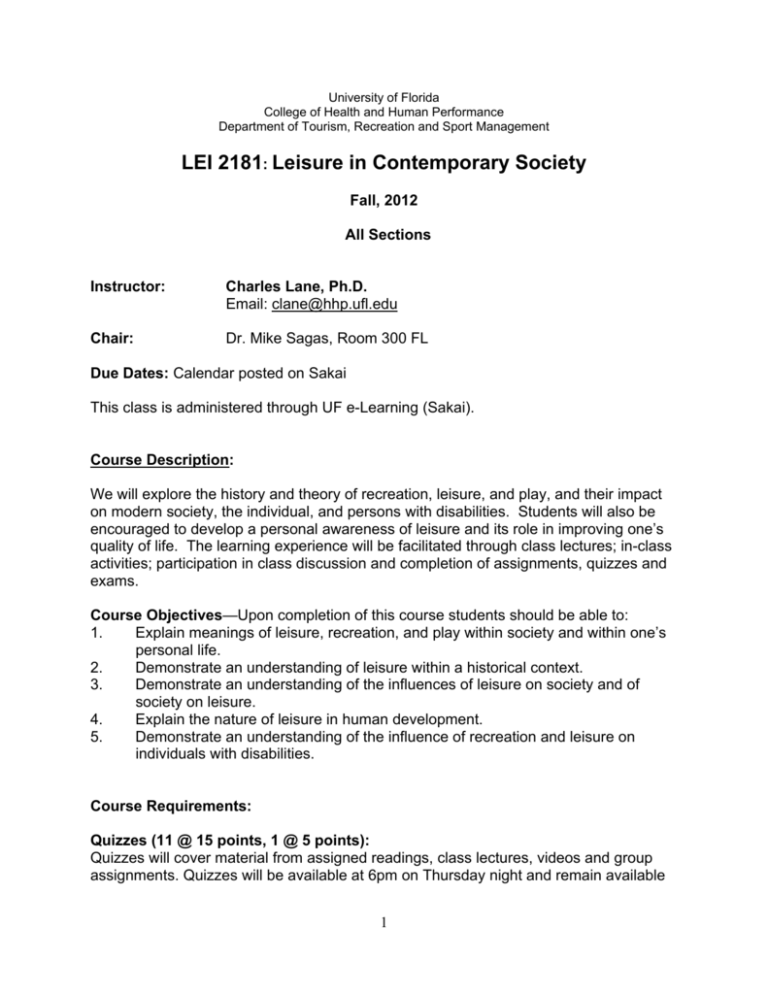
University of Florida College of Health and Human Performance Department of Tourism, Recreation and Sport Management LEI 2181: Leisure in Contemporary Society Fall, 2012 All Sections Instructor: Charles Lane, Ph.D. Email: clane@hhp.ufl.edu Chair: Dr. Mike Sagas, Room 300 FL Due Dates: Calendar posted on Sakai This class is administered through UF e-Learning (Sakai). Course Description: We will explore the history and theory of recreation, leisure, and play, and their impact on modern society, the individual, and persons with disabilities. Students will also be encouraged to develop a personal awareness of leisure and its role in improving one’s quality of life. The learning experience will be facilitated through class lectures; in-class activities; participation in class discussion and completion of assignments, quizzes and exams. Course Objectives—Upon completion of this course students should be able to: 1. Explain meanings of leisure, recreation, and play within society and within one’s personal life. 2. Demonstrate an understanding of leisure within a historical context. 3. Demonstrate an understanding of the influences of leisure on society and of society on leisure. 4. Explain the nature of leisure in human development. 5. Demonstrate an understanding of the influence of recreation and leisure on individuals with disabilities. Course Requirements: Quizzes (11 @ 15 points, 1 @ 5 points): Quizzes will cover material from assigned readings, class lectures, videos and group assignments. Quizzes will be available at 6pm on Thursday night and remain available 1 until 11:55pm on Sunday night. Quizzes can only be taken during the scheduled time frame. Once a quiz is closed it cannot be reopened for any reason. Term Project (50 points) Students are expected to complete a term project for this course. The project is worth 50 points, and takes the place of group discussions in this course. The project description is posted on the Sakai class homepage during the second week of class. Grades are awarded as follows: Grades Grading Scale: Syllabus Quiz Introduce yourself Weekly Quizzes Term Project 5 pts 5 pts 165 pts 50 pts Total Extra Credit 225 points 10 pts A = 90 – 100% B+ = 87 – 89.9% B = 80 – 86.9% C+ = 77 – 79.9% C = 70 – 76.9% D+ = 67 – 69.9% D = 60 – 66.9% E = 59.9% or below Your grade = (total points + extra credit) / 225 Fault vs. Responsibility It is your responsibility to complete the course requirements in a timely manor. In an online environment, technical problems may naturally occur – your computer may crash, or you may lose connectivity with your ISP, or you may be out of town and working on an unfamiliar computer. I understand that none of these, or other problems, is your fault. That said, completing the assignments in a timely manor is still your responsibility. Should you experience computer problems at home you may need to use another oncampus or off-campus computer to complete the assignments. Sakai Performance Report Students should be aware that Sakai records a great variety of statistics concerning students’ use of the software. The instructor is able to view the performance and activities of the students, including login attempts, time spent on quizzes, files viewed, etc. Sakai Announcements Throughout this semester I will be using the Announcements tool in Sakai. The Announcements posts new information on Sakai and emails students in the class AS A GROUP the same information. For this reason, you cannot, as an individual, reply to a 2 Sakai group email announcement and expect an individual reply from me. If you reply to a Sakai Announcement email, I will see this: in my Outlook inbox, and will not know who the email is from. If you need a response to your email, please use my regular email address for every course question: clane@hhp.ufl.edu Sakai Gradebook The Sakai gradebook offers a “calculated score” so that students can track their progress. Do not rely on Sakai’s calculated score. An oddity of the “calculated score” is that it does not include the negative effect of missed quizzes or assignments unless those scores are specifically entered as “zero” (and they typically are not). For that reason, a student who has missed ½ of the quizzes in a semester can still have a “calculated score” of 90%, an “A”, although their actual score may be less than 60%, an “E”. Personal Questions If you have a question that is of a personal nature, contact Dr. Charles Lane through e-mail at this address: clane@hhp.ufl.edu. Please do not use the Sakai message system to contact me (use my regular email address). Office Hours My online office hours are from 3-4pm Mom-Wed-Fri. That said, there really is no bad time to email or text me. If I’m available, I’ll answer or get back to you when I can. I am, however, more comfortable with email than text messages. Contact information (in order of effectiveness) Your first contact should always be with the syllabus. The syllabus is where the most-asked student question (Can you reopen a quiz for me?) is answered (“No”). clane@hhp.ufl.edu I check my email many times a day. Your email to me must say “LEI 2181” in the subject line. Your message to me must appear in the body of the email, and not sent as a text attachment. I will not open attachments to read messages. 3 My Google Voice number is 352-269-1717. You can send a text message, or leave an audio message during office hours that will be saved AND sent to me as an email message. Please use my Google Voice number only after regular email has failed us… Skype is least effective because it is a 2 step process – I have to accept your Skype ID before you can call me. Also, 24% of students don’t have a microphone attached to their computer. But where possible, we can use Skype as a back up communication system. Username: charleslanephd About Your Email… It is your responsibility to check your UF email account (and Sakai) for information about this class. Every semester a few LEI 2181 students lose the opportunity to complete required work because their UF mailbox is full. Class Policies: 1. 2. 3. 4. 5. You are responsible for both the information given online and the readings from supplemental resources. All class materials (articles, case studies) will be available through UF eLearning. Regularly scheduled tests will be in multiple choice / short answer format. Make-up exams will not be given. There will be a 10 point extra credit assignment at the end of the semester intended to make up for missed quizzes, etc. Accommodations for Students with Disabilities: If any student has a need for special test taking or note taking accommodations due to a disability, please let the professor know as soon as possible. This is your responsibility. Students requesting accommodation must first register with the Dean of Students Office (392-1261). The Dean of Students Office will provide documentation to the student who must then provide this documentation to the professor when requesting accommodation. Academic Honesty: As per the University’s Student Rights and Responsibilities (www.dso.ufl/STG) any student found cheating, plagiarizing a written assignment, or falsifying a course requirement will either receive a failing grade for the course or be referred for university disciplinary action. 4 PLAGIARISM: Plagiarism is considered as submitting someone else's work as your own, please be very aware of university policies and punishments if you fail to heed this warning. All students are advised to go to http://www.dso.ufl.edu/stg/default.html and click on the “Standard of Ethical Conduct” link and carefully read those sections. Students are reminded that they signed a copy of the Student Honor Code as part of their Application Process to this University and have agreed in writing to abide by it. Part of the code is to report cheating or plagiarism that you witness or have knowledge of. Help! In the event that you have technical difficulties with E-learning, please contact the UF helpdesk at learning-support@ufl.edu, or (352) 392-4357 - selection option 2. Note: The UF helpdesk closes at 5:00; it is recommended that you complete your assignments early in case you encounter technical difficulties. When you report a problem to the UF Computing Help Desk they will give you a “ticket number”. You must cite this ticket number when reporting your problem to the LEI 2000 instructor or TA. 5

